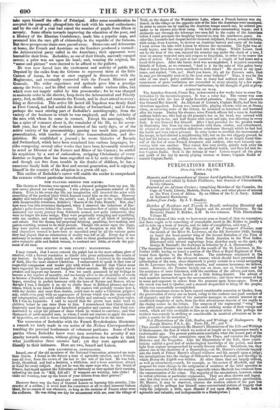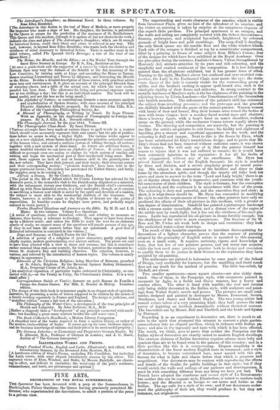PUBLICATIONS RECEIVED.
From July 11th to July 17th.
BOOKS.
Memoirs and Correspondence of George Lord Lyttelton, from 1734 to 1773. Compiled and edited by Robert Philhmore, late Student of Christchurch, In two volumes.
Journal of an African Cruiser; comprising Sketches of the Canaries, the Cape de Verds, Liberia, Madeira, Sierra Leone, and other places of interest on the West Coast of Africa. By an Officer of the U. S. Navy. Edited by Nathaniel Hawthorne.
Letters from I taffy. By J. T. Headley.
Sketches of Residence and Travels in Brazil; embracing Historical and Geographical Notices of the Empire and its several Provinces. By the Reverend Daniel P. Kidder, A.M. In two volumes. With Illustrations. Volume IL [The first volume of this work we have never seen or heard of, that we remember; and there ought to be something of remarkable merit in Mr. Kidder to justify S call to take up a book of travels, and we infer of compilation, mid-way.] A Brief Narrative of the Shipwreck of the Transport Premier, near the mouth of the River St. Lawrence, on the 4th November 1843; having on board the head-quarter wing of Ile the Battalion of the First or Royal Regiment, proceeding from North America to the West Indies. I lastrated with several engravings from sketches made on the spot; by George R. Dartuell ; the drawings in lithotint by J. A. Hammersley. [The transport Premier was wrecked at the mouth of the St. Lawrence, in No- vember 1843; having on board a portion of the First or Royal Regiment of Foot, bound from Quebec to the West Indies. The misfortune originated in the fogs and snow-mists of the advanced season; which should have prevented the embarkation of the men, since shipwreck is pretty certain to a vessel navigating the St. Lawrence dining the winter months, and common insurance, we believe, ceases. However, the Premier luckily ran on shore, not on breakers; and by the assistance of some fishermen, with the exertions of the officers and men, the whole of the persons were landed at a little fishing-hamlet. The advent of such numbers encroached upon the accommodation; and there were scenes of fun to some and exposure to others from the pressure upon house-space. News of the wreck was sent to Quebec, and a steamer despatched to bring off the people; which was successfully accomplished.
The circumstance seems to have caused considerable sensation at Quebec, from the preservation of every one on board, owing to the coolness and good conduct of all engaged; and the writer of the narrative manages to sustain interest by an unaffected simplicity of style, from the first adventurous descent of the rapids to the closing scenes on the return. The surgeon of the regimental " wing" has also added some graphic sketches of the most striking scenes of their voyage and wreck, which are very creditable to him as an amateur artist. But perhaps the incident was scarcely so strikino or considerable in nautical adventure as to re- quire a quarto for its narration.
New Illustrations of the fe, Studies, and Writings of Shakespeare. By Joseph Hunter, 1.S.A., &c. Parts III., IV., and V. [This second volume completes Mr. Hunter's Illustrations of the Life and Writings of Shakespeare, the first of which we noticed at length on its appearance nearly a twelvemonth ago. The present publication concludes what the second part of the first volume began,—the annotations upon the Plays, and contains the English Histories and the Tragedies. Like the Illustrations of the Life, these contri- butions exhibit a good deal of archmological knowledge of the period, and draw light from regions unapproached by merely literary editors. Sometimes, too, they almost rise to the character of a dissertation,—as Mr. Hunter's elaborate inquiry into the troth of Prince Henry's alleged wildness and his assault upon a judge; his investigations into the change of Oldcastle's name to Falstaff; and the reign in which Henry the Eighth was written. At other times they are largely critical, as well as emendatory,—such, for example, as the review of Macbeth, and the proposal for some change in the assignment of members of the brief speeches in the scenes connected with the murder, especially where Macbeth has returned from the consummation of his crime. The majority of the annotations, however, relate to verbal criticism or particular explanation. They are often shrewd and ingeni ors; but they seem to us occasionally uncalled-for, and sometimes questionable. Mr. Hunter, it may be observed, esteems the modern editors of the poet but slightly; and he perhaps has himself some conventional notions of tragedy that warp his judgment a little, upon Hamlet if not upon Macbeth. The book its agreeable and valuable, and indispensable to a Shakspernth.1 The Astrologer's Daughter; an Historical Novel. In three. volumes. By Rose Ellen Hendriks.
[The Astrologer in this fiction is the tool of Mary of Medicis, or more properly Use impostor who made a dupe of her. His daughter, the heroine is patronized by the Queen in return for the prediction of the massacre of St. Bartholomew. This Queen and this incident, (though it is spoken of, but not shown in the work,) indicate the time and place of The Astrologer's Daughter; which are fit enough for historical fiction, could their blood and crime be relieved in any way. This task, however, is beyond Rose Ellen Hendriks; who wants both the elevation and vividness of mind necessary to historical fiction. There is another story in the third volume, called The Spanish Girl's Revenge; a tale of the time of our Queen Mary.]
The Meuse, the Moselle, and the Rhine ; or a Six Weeks' Tour through the finest River Scenery in Europe. By B. S., Esq., Barrister-at-law. Wiellince a guide-book and the suggester of a course by which the visiter to the Spas may vary the dulness of the Scheldt or the fiat monotony of the Low Countries, by turning aside at Liege and ascending the Meuse to Namur, thence reaching Luxemburg and Treves by diligence, and descending the Moselle to the Rhine. Besides a detailed description of these routes, with practical advice upon inns and conveyances, B. S. gives an account of the principal Rhenish Spas or watering-places, and a table of the actual cost, for which the tour recom- mended has been done. The allowance for living and personal expenses seems low at ten shillings a day: but this is an individual matter. The book will be found useful, and not the less so for being small.]
The Alphabet of Nature; or contributions towards a more accurate analysis and symbolization of Spoken Sounds; with some account of the principal Phonetic Alphabets hitherto proposed. By Alexander John Film, B.A., Fellow of the Cambridge Philosophical Society, tee.
A Manual of Phonography, or Writing by Sound. By Isaac Pitman. With an Appendix, on the Application of Phonography to Foreign lan- guages. By. A. J. Ellis, B.A. Seventh edition.
The Phenotype Journal, for the year 1844. Volume III. The Phonographic Class-Book. By Isaac Pitman. [Various attempts have been made at various times to spell words in a manner which should more accurately represent their real sound; but the pile of publics- ti0/18 before us seems to wing a higher flight. The various works appear to aim at a new alphabet, whose forms shall represent the primitive articulate sounds of the human voice; and extend a uniform system of writing through all nations; together with a new system of short-hand. As letters are arbitrary forms, it seems doubtful whether we can have an Alphabet of Nature. It seems equally difficult to persuade even one nation to change its whole system of reading and writing and begin the mechanical part of their intellectual being anew. How- ever, there appears no lack of zeal or business skill in the promulgators of the new reform. They have their journal, and their tracts; their itinerant orators and their corresponding society; "phonetic festivals" have been held in the larger provincial towns; the system has penetrated the United States; and lastly, the supplies seem to be coming in Alfred; a Drama. By Sir (;putts Lindsay, Bart.
The period in the life of Alfred which Sir Contts Lindsay has selected for his tie poem, is the monarch's visit to the Danish camp disguised as a minstrel, with the subsequent victory over Guthrum, and the Danish chief's conversion. Mixed up with these historical events, is a fairy underplot; though, as it consists in sacrificing a human soul which is saved by the spirit and devotion of a maiden, the subject is more akin to the nondescript diablerie of the Germans. Sir Contts,. however, is neither equal to the heights of history nor the genius of superstition. In humbler scenes he displays more power, and probably might succeed in rustic poetry.]
Twelve Hundred Questions and Answers on the BZ1e. By M. H. and L H. Myers. In two volumes. Volume I..-- Questions.
[A series of questions, rather historical, critical and relating to manners or diatoms, than having a reference to theology. They appear to have been drawn up by aHebrew mind: and unless the Bible be made the text for an elaborate course of study, we suspect many of the questions will puzzle persons of any age, if they do not learn the answers before they are questioned. A good deal of Hebraical information is contained in the volume.]
Days and Seasons; or Church Poetry for the Year.
A selection of poetry of a religious or grave character; partly original but y reprint, modern predominating over ancient authors. The pieces are said to have been selected with a view to times and seasons; but this is sometimes rather nominal than real,—one scarcely, for instance, perceives the connexion be- tween St. Andrew's Day and building churches.The selection, however, is various, and relieved 1,the introduction of human topics. The volume is neatly elegant in appearance.
Elements of the hristian Religion; being Sketches of Sermons, preached at St. John's, Brighton. By the Reverend Spencer Rodney Drummond, ALA., Perpetual Curate of St. John's, &c.
[An analytical exposition of particular topics embraced in Christianity, or con- nectedaffi with it,—as the Trinity in Unity, the Churchman's Duties. It is a very dr.]
Correspondence Suivie et Variie; ferment un petit Roman de Famille l'usage des Jeunes Dames. Par Mlle. E. Benoist de Maim. Troisieme edition.
[The design of this little book is to instruct pupils in an elegant style of epistolary narrative, by presenting a series of letters supposed to be written by the sisters of a family residing separately in France and England. The design is judicious, and " troisieme edition seems ft fair test of the execution.] -
The Philosophy of the Water Cure; a development of the tree principles of Health and Longevity. Ry John Balbirnie, MA., M.D. [Rather a rhapsody than a " development " of any principle connected with medi- cine; but handling a great-many matters besides the cold water cure.] The Book-Collector's Handbook; a Modem Library Companion.
[A classified view of the books required to form a modern library, or rather of the modern trade-editions of books. It seems got-up. for some business objects; and its business knowledge of editions and their prices is its most useful property.] The German Delectus ; or Elementary and Progressive German Reader. By E. Albrecht, M.A., Professor of German in London; and J. C. Moore, Author of " The German Interpreter."
ILLUSTRATED WORKS AND PRINTS.
Gray's Poetical Works, English and Latin, Illustrated; and edited, with Introductory Stanzas, by the Reverend John Moultrie, M.A.
[A handsome edition of Gray's Poems, excluding The Candidate, but including the Latin verses, with some elegant introductory stanzas by the editor. The engraved views of Eton, Windsor, and Stoke, by Messrs. Radclyffe, are charm- ing m effect, and delicate in execution: the wood-cats of the poet's residence, summerhouse, and tomb, are picturesque and spirited.]



























 Previous page
Previous page